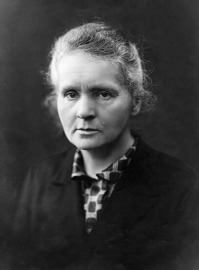
Marie Curie
Maria Salomea Skłodowska-Curie, known simply as Marie Curie, was a Polish and naturalised-French physicist and chemist who conducted pioneering research on radioactivity. She was the first woman to win... Wikipedia
- Born: Maria Salomea Skłodowska, November 7, 1867, Warsaw, Congress Poland, Russian Empire (now Poland)
- Age at death: 66 years
- Died: July 4, 1934, Passy, Haute-Savoie, French Third Republic (now France), Aplastic anaemia
- Citizenship: France (1895–1934)
- Fields: Physics, Chemistry
- Institutions: University of Paris, Institut du Radium, École Normale Supérieure, French Academy of Medicine, International Committee on Intellectual Cooperation
- Alma mater: University of Paris
- Thesis: Recherches sur les substances radioactives (Research on Radioactive Substances) (1903)
- Doctoral students: André-Louis Debierne, Gioacchino Failla, Ladislas Goldstein, Émile Henriot, Irène Joliot-Curie, Óscar Moreno, Marguerite Perey, Francis Perrin
- Known for: Pioneering research on radioactivity, Discoveries of polonium and radium
- Notable awards: Davy Medal (1903), Nobel Prize in Physics (1903), Matteucci Medal (1904), Actonian Prize (1907), Elliott Cresson Medal (1909), Albert Medal (1910), Nobel Prize in Chemistry (1911), Willard Gibbs Award (1921), John Scott Medal (1921), Cameron Prize for Therapeutics of the University of Edinburgh (1931)
- Children: Irène, Ève
- Data source: DuckDuckGo